Overview
The article examines the key strengths and weaknesses of public and private land record systems, emphasizing their distinct impacts on real estate transactions.
- Public systems offer transparency and cost-effectiveness; however, they face challenges such as inconsistencies and bureaucratic delays.
- In contrast, private systems provide enhanced data quality and faster access, albeit at the cost of limited transparency and potential fees.
This underscores the necessity for a hybrid approach to optimize property management.
Introduction
Public and private land record systems are the backbone of real estate transactions, each presenting unique advantages and challenges that shape the landscape of property ownership.
- Public systems promote transparency and accessibility, while private frameworks offer enhanced data quality and speed.
- The choice between them significantly influences the effectiveness of real estate dealings.
However, as the complexities of these systems unfold, questions arise:
- Can a hybrid approach that combines the strengths of both frameworks truly optimize property management, particularly in a world where a staggering percentage of land remains undocumented?
Exploring this critical comparison reveals not only the operational nuances but also the broader implications for stakeholders navigating the intricate terrain of land records.
Understanding Public and Private Land Record Systems
Public databases maintained by the government provide extensive access to details regarding ownership, boundaries, and legal claims. These documents are generally accessible to the public, fostering transparency and accountability in real estate transactions. In contrast, private property documentation frameworks are overseen by private entities or organizations, which may impose restrictions on access to certain information. While these proprietary databases can offer valuable insights, they often come with associated costs or access limitations.
Statistics indicate that approximately 80% of real estate experts rely on public documentation, underscoring its significance in ensuring accurate and timely information for real estate dealings. For instance, the Capitol Crossing initiative in Washington, DC, exemplifies how experts leveraging public property documentation effectively managed complex transactions, thereby highlighting the importance of understanding these frameworks.
The distinction between public vs private land record systems is crucial for real estate experts, as it directly impacts their ability to conduct informed transactions and mitigate risks associated with property ownership. As Robert Braunohler, regional vice president for Property Group Partners, noted, "Adequate property value is a challenge for projects like Capitol Crossing, emphasizing the significance of dependable information frameworks in making informed choices.
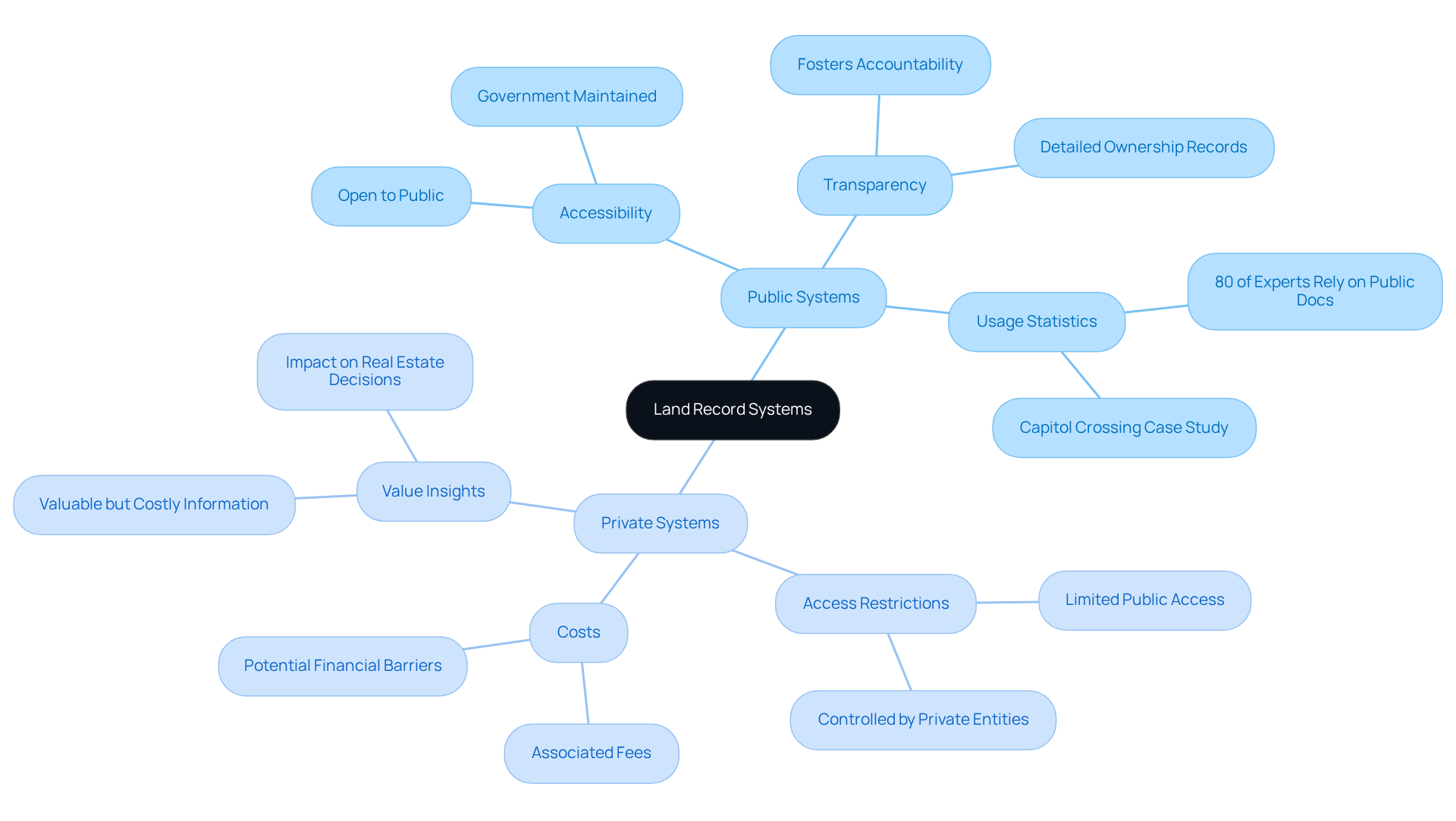
Strengths of Public Land Record Systems
The advantages of public vs private land record systems significantly enhance their utility for real estate professionals.
-
Transparency in public vs private land record systems ensures open access to real estate records, allowing anyone to verify ownership and legal claims. This transparency fosters trust in real estate transactions and helps mitigate disputes in the context of public vs private land record systems. As M. Denzell Moton, Esq. states, "Recording documents such as deeds aids in clarifying who possesses the asset."
-
Legal Protection: The distinction between public vs private land record systems serves as a legal safeguard for landowners, documenting their rights and protecting against fraudulent claims. This legal framework is essential in resolving ownership conflicts and clarifying rights related to assets. Moton emphasizes, "The primary reason is that they do not transfer ownership of the property."
-
Standardization: Public vs private land record systems typically adhere to standardized procedures and formats, which simplifies navigation and comprehension for users. This consistency aids title researchers in efficiently locating and interpreting necessary information.
-
Cost-Effectiveness: Accessing public vs private land record systems is generally free or low-cost, making it an economical choice for title researchers and real estate professionals. This affordability allows for broader access to essential data without significant financial burden.
-
Comprehensive Data: Public vs private land record systems encompass a wide array of information, including historical ownership data, liens, and easements. This comprehensive dataset provides a complete picture of an asset's legal status, which is vital for informed decision-making in real estate transactions. Clear Capital states, "Comprehensive recorder deed data is essential for smooth real estate transactions."
The integration of these strengths enhances the efficiency of real estate processes and contributes to a more transparent and equitable market, especially when considering public vs private land record systems. Furthermore, comprehending the information on legal conflicts concerning public asset documentation can offer perspectives on the significance of these frameworks in safeguarding ownership rights.
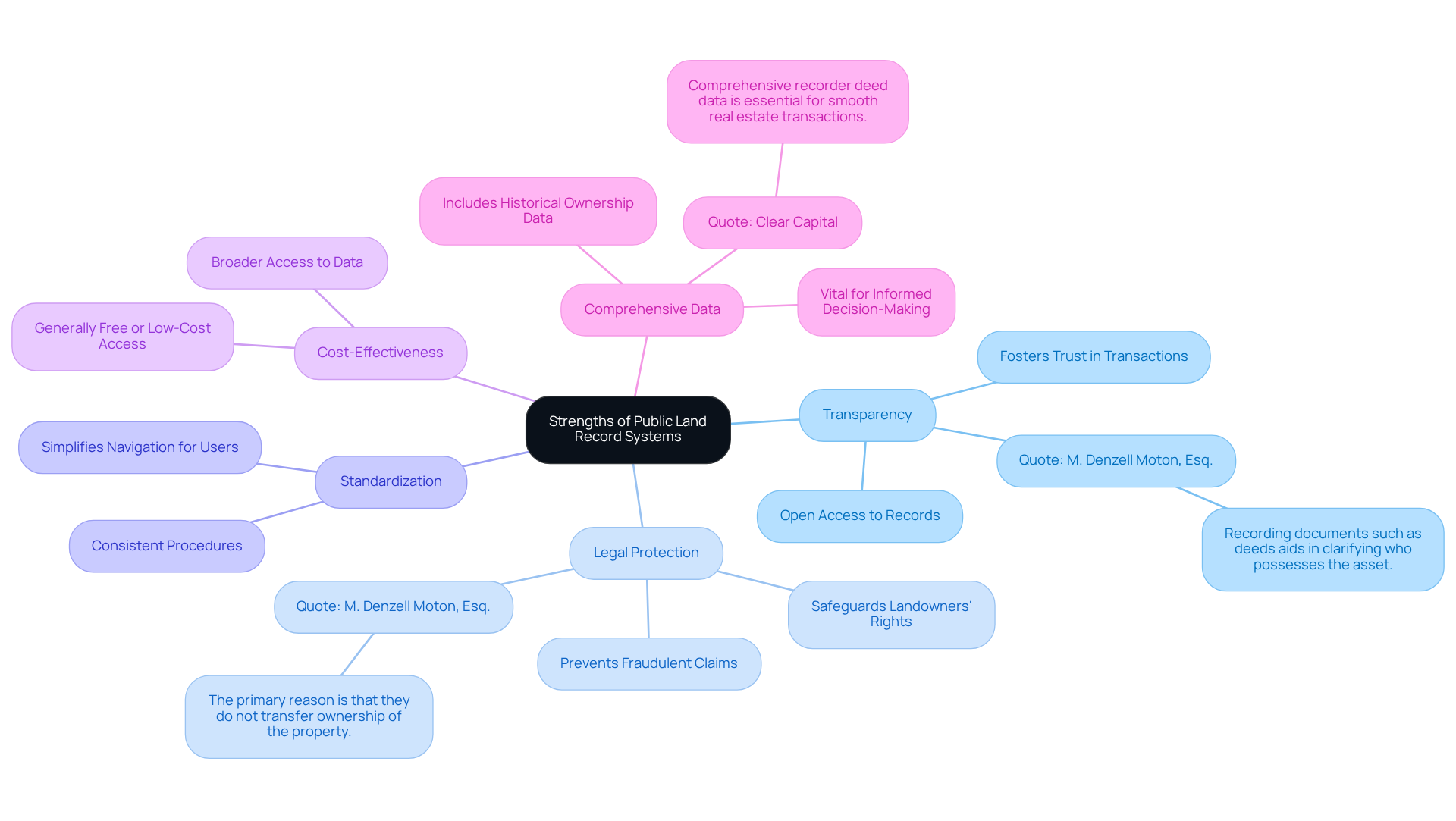
Weaknesses of Public Land Record Systems
The public vs private land record systems, despite their advantages, exhibit significant weaknesses that can complicate property transactions and ownership verification.
Inconsistencies in public vs private land record systems often lead to errors or outdated information, which can result in disputes over property ownership. A case study emphasized that inadequately handled property documentation can lead to substantial project failures, with financial repercussions for stakeholders. This issue is particularly evident in the U.S. property documentation system, which has faced criticism for its lack of modernization since its establishment in the 1850s.
Limited accessibility remains a challenge, as many jurisdictions impose restrictions or cumbersome processes that hinder information retrieval. Reports indicate that cities like Spokane face overwhelming delays, with some requests taking over six months to fulfill, severely impacting decision-making. Furthermore, organizations have a federal budget allocation of $1,670.6 million for implementing best practices in land records management, highlighting the urgent need for improved funding and resources to address these accessibility issues.
The lack of comprehensive coverage in certain regions, especially those with less stringent record-keeping practices, leaves many assets inadequately documented. This gap can render property owners vulnerable; informal ownership transfers often lead to properties becoming ineligible for mortgage collateral. Notably, over a third of Black-owned land in the South cannot be used as mortgage collateral due to undocumented ownership, illustrating the severe consequences of inadequate documentation.
Slow updates in public documents create gaps in information, as alterations in ownership or legal claims may not be swiftly reflected. This delay complicates transactions, as stakeholders may inadvertently rely on outdated data when making critical decisions.
Bureaucratic delays in obtaining documents from public vs private land record systems can further hinder prompt decision-making in real estate transactions. Advocates for transparency highlight that the growing intricacy of inquiries and backlog in processing exacerbate these delays, complicating the environment for real estate professionals. A particular case study revealed that Spokane's documentation department encountered significant delays, with numerous requests requiring six months or more to complete. Consequently, city officials are contemplating employing additional personnel to enhance the situation.
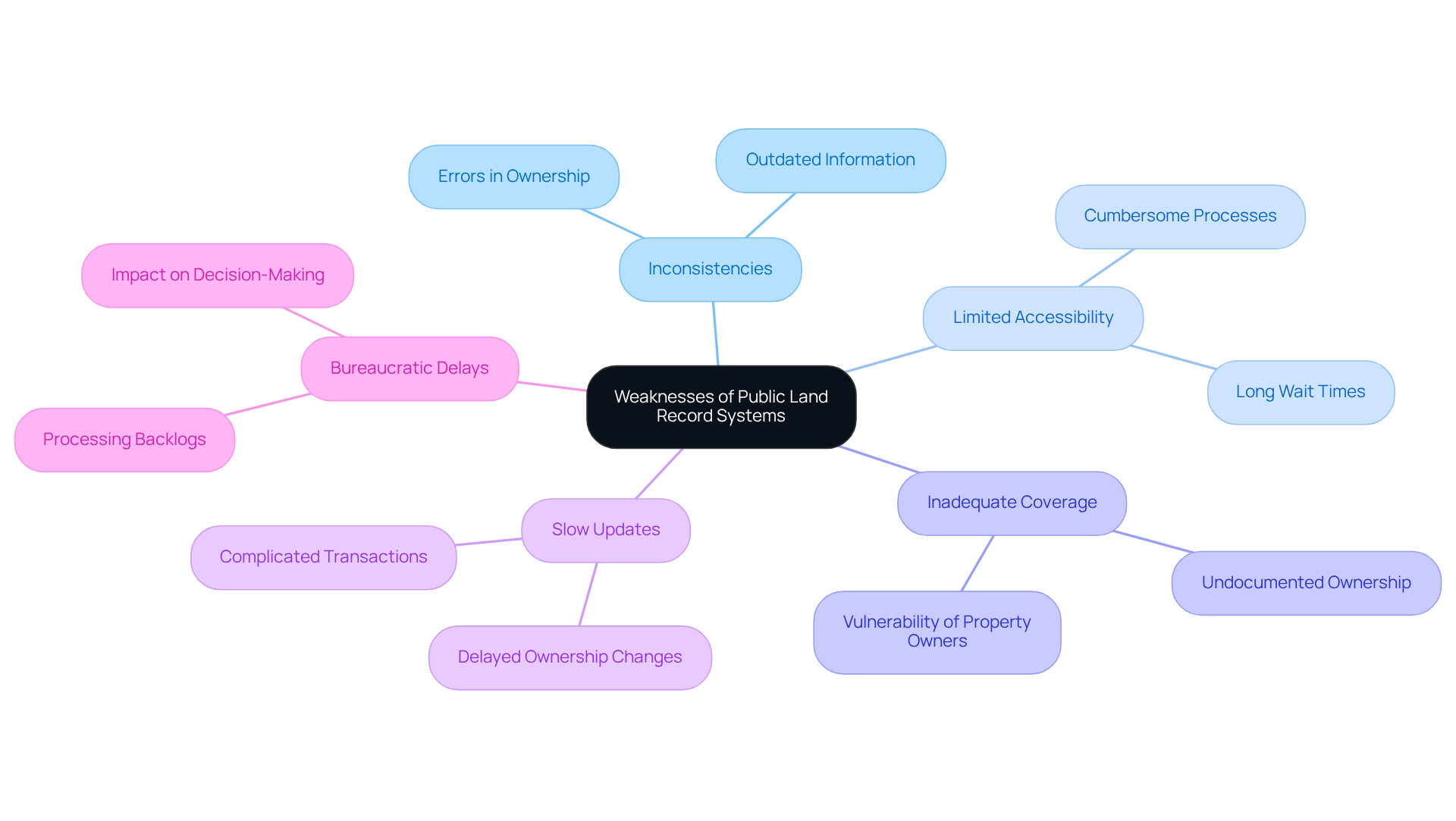
Strengths of Private Land Record Systems
Private land record systems offer several significant advantages:
- Enhanced Data Quality: Private networks leverage advanced technologies and methodologies to ensure data accuracy and completeness.
- Faster Access: Many private networks facilitate expedited access to documents, allowing for quicker retrieval of information in comparison to public vs private land record systems.
- Comprehensive Insights: Private documents often encompass additional data points, such as market trends and property valuations, which can greatly assist in informed decision-making.
- User-Friendly Interfaces: These networks typically feature intuitive interfaces and robust search functionalities, simplifying the process for users seeking relevant information.
- Personalization: Private networks can be tailored to meet the unique requirements of users, providing focused information that may not be available when comparing public vs private land record systems.
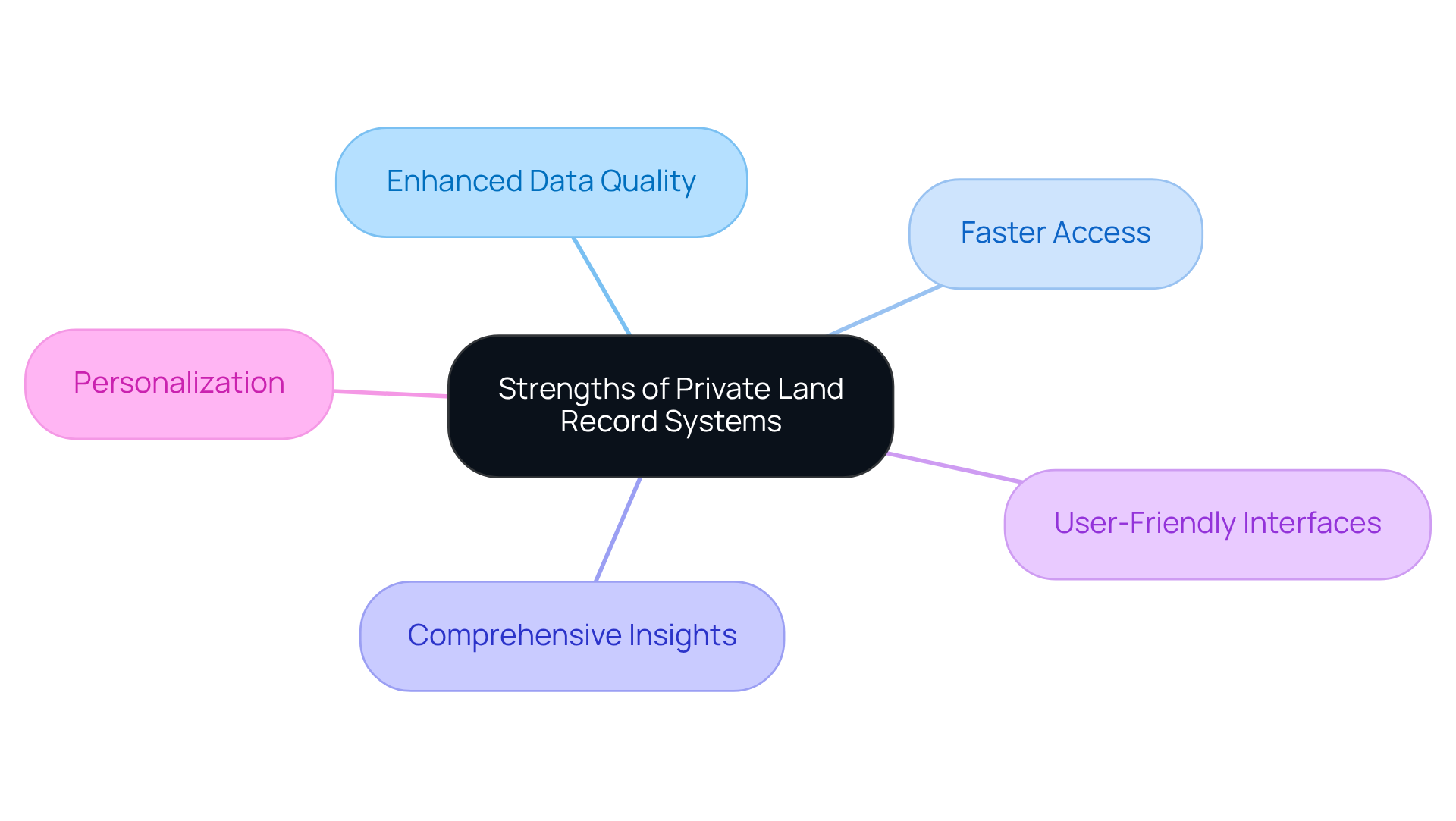
Weaknesses of Private Land Record Systems
The weaknesses of private land record systems, despite their advantages, can impede their effectiveness in real estate transactions when compared to public vs private land record systems.
Cost: Accessing private documents often incurs fees, posing substantial barriers for users, particularly those with limited financial resources.
Limited clarity in public vs private land record systems often results in a lack of transparency that is typically found in public records, raising concerns about the integrity and reliability of the data provided. For instance, the absence of formal documentation led to '20,000 landowners being denied federal assistance after Hurricane Katrina due to insufficient ownership documentation.'
Access Restrictions: Many private networks impose limitations on access to specific information, complicating users' efforts to gain a comprehensive understanding of property ownership. As Brent Jones asserts, "Without formal documentation such as deeds recorded in a government registry, there is no publicly searchable record of ownership when considering public vs private land record systems."
Data Fragmentation: Information is often scattered across various private platforms, requiring users to navigate multiple databases to compile complete data sets.
Reliance on Technology: Users may encounter obstacles when private networks face technical issues or outages, hindering access to vital information.
The implications of these weaknesses are profound, as they can result in incomplete property assessments within public vs private land record systems and obstruct effective decision-making in real estate transactions.
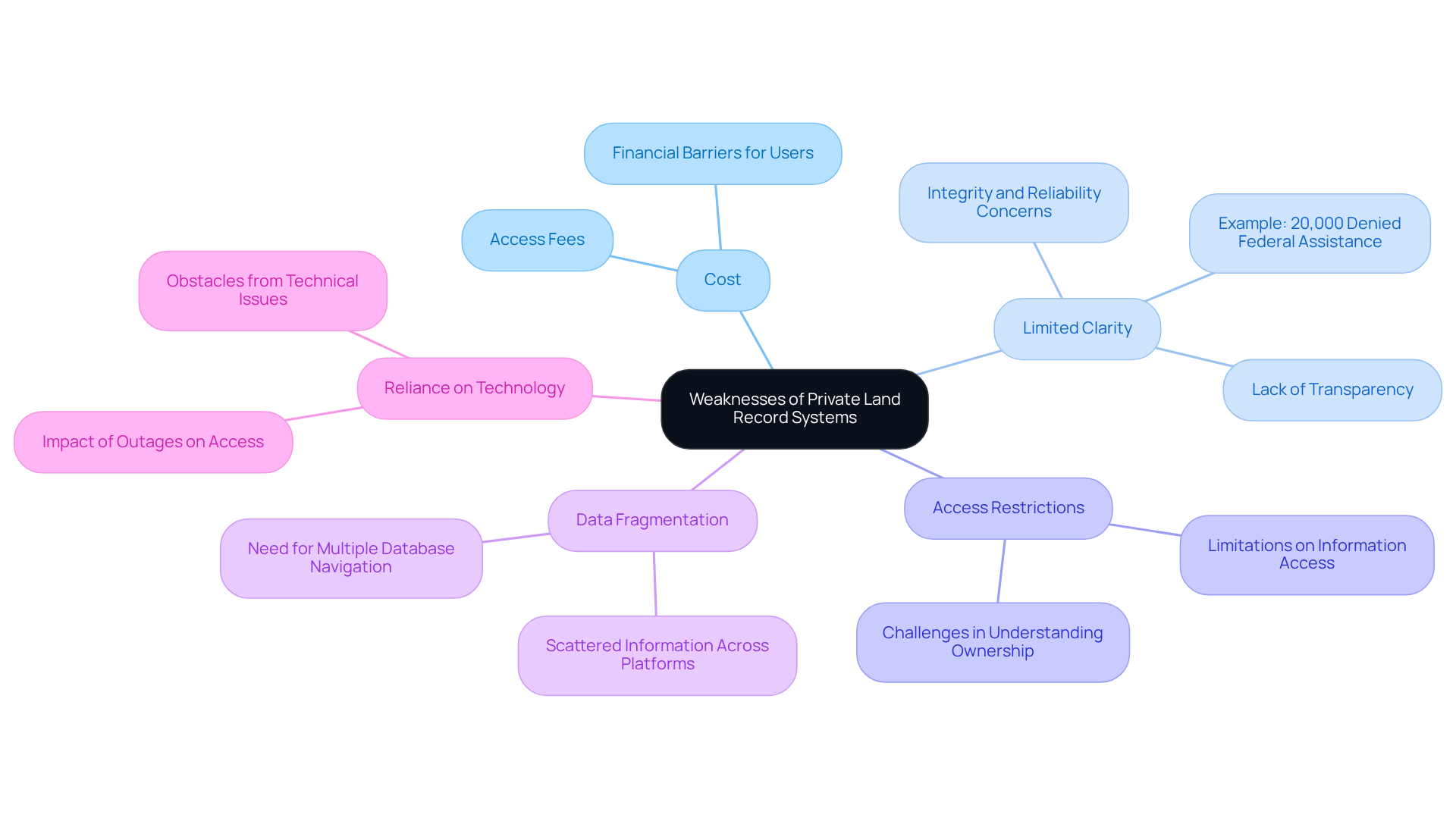
Comparative Summary: Public vs Private Land Record Systems
In summary, the public vs private land record systems each possess distinct strengths and weaknesses that warrant careful consideration.
Public Land Record Systems offer transparency, legal protection, and cost-effectiveness; however, they may be hindered by inconsistencies and bureaucratic delays. Klaus Deininger, a World Bank expert on property, underscores this issue by noting that fewer than a third of nations keep records digitally, which highlights the challenges faced by public frameworks.
Private Land Record Systems, on the other hand, deliver enhanced data quality, quicker access, and comprehensive insights, though they often entail costs and limited transparency. The privatization of land registry services in Malaysia serves as a pertinent example, illustrating the complexities and potential benefits of private arrangements.
Real estate experts must evaluate these aspects in light of their specific requirements, considering whether the advantages of one framework can compensate for the shortcomings of the other. Ultimately, a hybrid approach that integrates documentation from public vs private land record systems may yield the most comprehensive solution for title research and property ownership verification. This model not only addresses the deficiencies of each system but also enhances overall efficiency and accuracy in property management. Furthermore, with 70 to 90% of land in emerging economies remaining undocumented, the hybrid approach becomes increasingly pertinent in ensuring effective land record management.
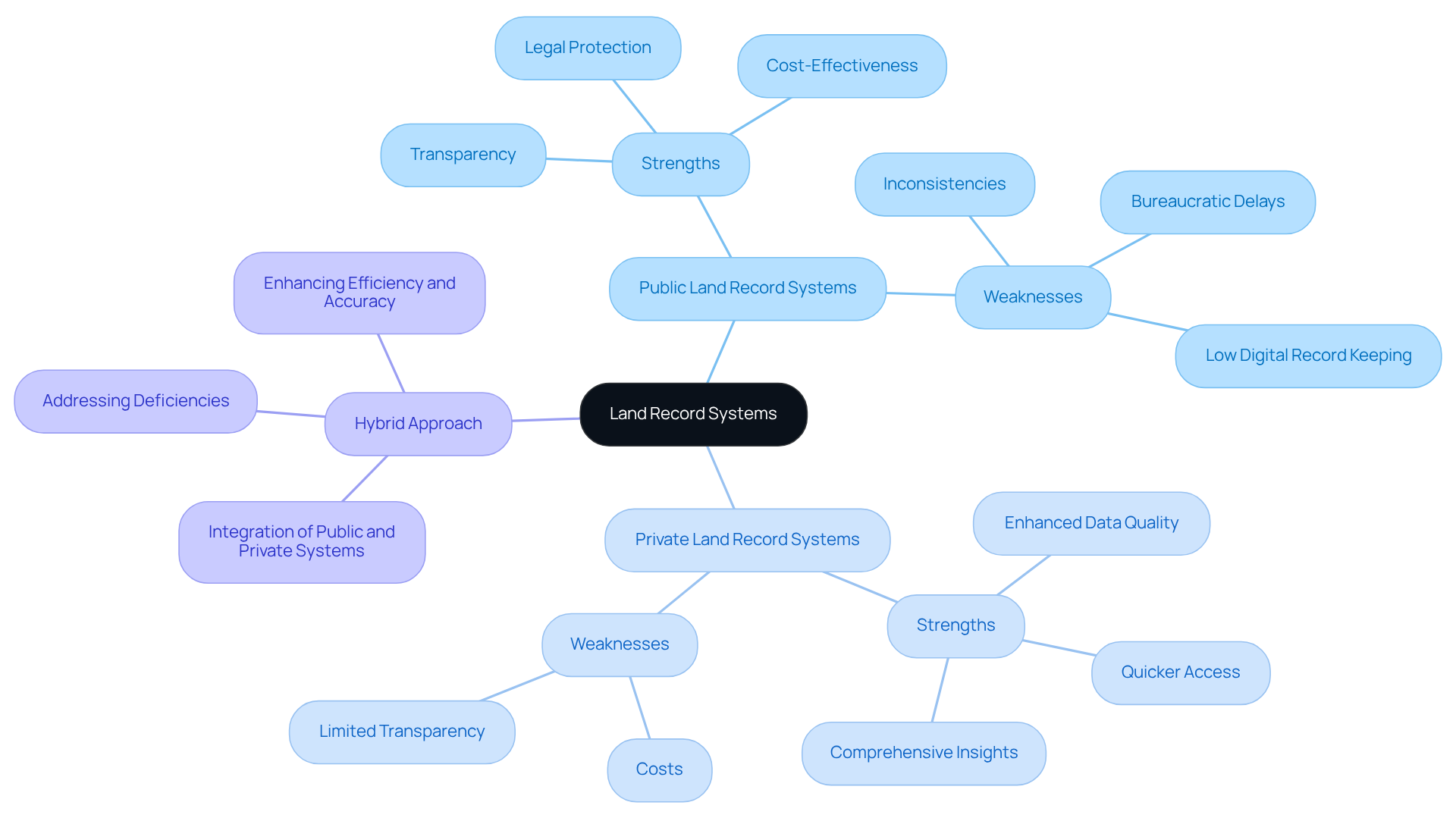
Conclusion
The exploration of public versus private land record systems reveals a critical understanding of how these frameworks impact real estate transactions and property ownership. Public systems, characterized by their transparency and accessibility, play a vital role in fostering trust and accountability. Conversely, private systems offer enhanced data quality and expedited access; however, they often come with costs and restrictions that can hinder comprehensive understanding.
Key insights from this comparison highlight the strengths of public systems, such as their cost-effectiveness and legal protections, which are essential for mitigating disputes and ensuring informed decision-making. Nevertheless, challenges like bureaucratic delays and inconsistencies can complicate matters. On the other hand, private systems provide valuable insights and quicker access to information, yet they may lack the transparency and accessibility that public records inherently offer.
In light of these findings, adopting a hybrid approach that integrates elements from both public and private land record systems could optimize property management and enhance the reliability of real estate dealings. This strategy not only addresses the limitations of each system but also promotes a more efficient and accurate framework for managing land records. As the landscape of property ownership continues to evolve, stakeholders are encouraged to consider these insights to navigate the complexities of land documentation effectively.
Frequently Asked Questions
What are public land record systems?
Public land record systems are databases maintained by the government that provide extensive access to details regarding property ownership, boundaries, and legal claims. These documents are generally accessible to the public, promoting transparency and accountability in real estate transactions.
How do private land record systems differ from public ones?
Private land record systems are overseen by private entities or organizations, which may impose restrictions on access to certain information. While they can offer valuable insights, they often come with associated costs or access limitations.
Why do real estate experts prefer public documentation?
Approximately 80% of real estate experts rely on public documentation because it ensures accurate and timely information for real estate dealings, which is crucial for informed transactions and risk mitigation.
What are the strengths of public land record systems?
Public land record systems provide transparency, legal protection, standardization, cost-effectiveness, and comprehensive data, making them highly beneficial for real estate professionals.
How does transparency in public land record systems benefit real estate transactions?
Transparency allows anyone to verify ownership and legal claims, fostering trust in real estate transactions and helping to mitigate disputes.
What legal protections do public land record systems offer?
Public land record systems document landowners' rights, protecting against fraudulent claims and clarifying ownership, which is essential in resolving conflicts.
How does standardization in public land record systems enhance usability?
Standardized procedures and formats simplify navigation and comprehension for users, aiding title researchers in efficiently locating and interpreting necessary information.
Are public land record systems cost-effective?
Yes, accessing public land record systems is generally free or low-cost, making it an economical choice for title researchers and real estate professionals.
What type of data do public land record systems encompass?
Public land record systems include a wide array of information such as historical ownership data, liens, and easements, providing a complete picture of an asset's legal status.
How do public land record systems contribute to the real estate market?
The integration of the strengths of public land record systems enhances the efficiency of real estate processes and contributes to a more transparent and equitable market.




